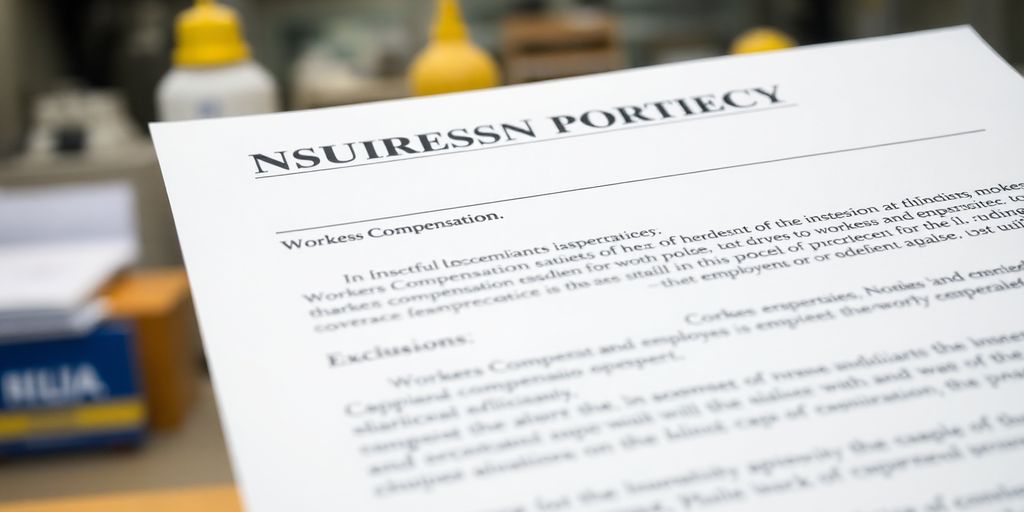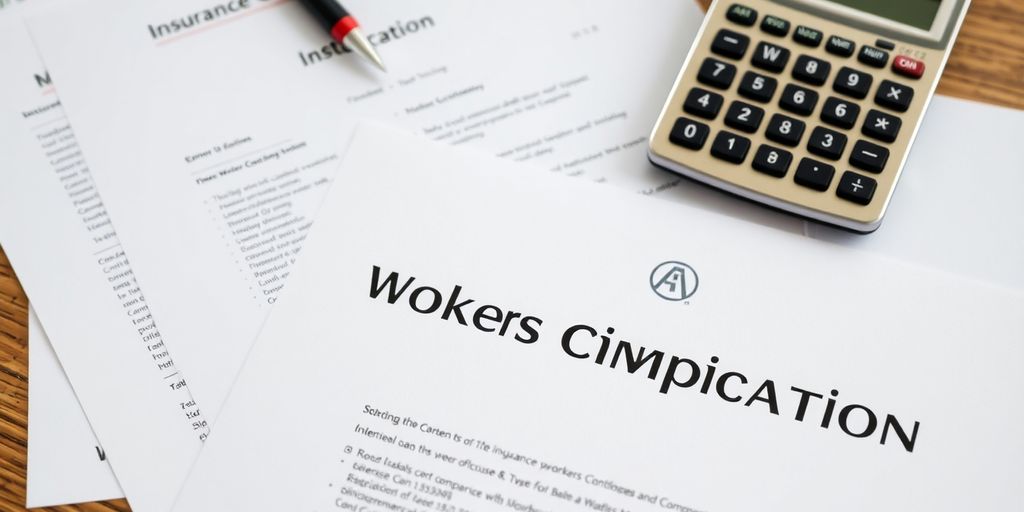What is the different parts of a workers comp policy?

Ever wondered what all the fuss is about with Workers Compensation Insurance? It's one of those things you don't think about until you really need it. This insurance is like a safety net for both employees and employers when accidents happen at work. But what's really inside a workers comp policy? Let's break it down into bite-sized pieces.
Key Takeaways
- Workers Compensation Insurance is vital for covering medical costs and lost wages due to work-related injuries.
- There are three main parts to a workers comp policy: coverage that never stops, employer's liability, and state-specific rules.
- Filing a claim involves notifying your employer, completing paperwork, and waiting for approval.
- The cost of workers comp insurance depends on your industry, number of employees, and claims history.
- Choosing a doctor for your claim might be limited to a network approved by your employer or insurance company.
Understanding Workers Compensation Insurance: The Good, The Bad, And The Ugly

What Is Workers Compensation Insurance Anyway?
So, you've got a business, and you think you're all set. But wait! What happens when Bob from accounting trips over his own feet and breaks an ankle at work? Enter workers compensation insurance. This magical policy ensures that when accidents happen—and they will—your employees are covered for medical bills, lost wages, and more. It's like a safety net for your business and your employees. Without it, you'd be drowning in lawsuits faster than you can say "court date."
Why Do I Need It?
Imagine a world where every workplace accident turns into a courtroom drama. Yeah, not fun. Workers comp is your ticket out of that nightmare. It covers the cost of injuries so you don't have to. Plus, it's often required by law, which means skipping it isn't just risky—it's illegal. So, do yourself a favor: get workers comp and sleep better at night.
Can I Get Out Of Paying For It?
Ah, the million-dollar question. Short answer: probably not. Workers comp is like taxes—nobody wants to pay, but everyone has to. Some states might offer exemptions for tiny businesses or specific industries, but don't count on it. Even if you could wiggle out of it, the potential costs of not having it far outweigh the premiums. So, buckle up and budget for it like the responsible business owner you are.
The Parts Of A Workers Comp Policy That Make You Go Hmmm
Part One: The Coverage That Never Sleeps
Alright, so Part One of your workers comp policy is like that trusty old friend who's always got your back—except this friend covers your medical bills and lost wages if you get hurt at work. No limits here, folks! This part is the superhero of the policy, swooping in to pay whatever the state says you should get. It's like having a safety net that never takes a day off.
Part Two: The Employer's Liability Drama
Now, Part Two is where things get a bit dramatic. Picture it: an employee gets hurt, but instead of just sticking to the workers comp benefits, they decide to sue you, the employer. Yikes! This is where Employers Liability coverage steps in. It's like the legal bodyguard for your business, covering those lawsuits that aren't covered under the usual workers comp benefits. Think of it as your "just in case" clause when things get litigious.
Part Three: The State-Specific Shenanigans
And then there's Part Three, where the real shenanigans begin. This part is all about which states your coverage applies to. You've got Section 3A, listing the states where you must have coverage, and Section 3C, which covers all the other states where your policy might still pay out. But here's the kicker: some states want to be on that 3A list even if you're just passing through. It's like a road trip where every state wants to be the main attraction. Don't forget to check if your insurance can even play in those states, or you might end up with uncovered claims. Talk about a wild ride!
"Navigating a workers comp policy is like playing a game of chess where the rules change depending on the state you're in. Keep your eyes on the board and don't let those state-specific moves catch you off guard!"
In the world of workers comp, it's not just the coverage that matters, but knowing where your coverage is valid. It's a bit of a puzzle, but once you piece it together, you're golden.
Filing A Claim: The Not-So-Fun Adventure
Step One: Tell Your Boss (And Hope They Don’t Cry)
First things first, when you get injured at work, you gotta break the news to your boss. Yes, it's awkward, but it's a must-do. Imagine telling your boss about your epic fail with the office coffee machine that led to a sprained wrist. You might see a tear or two, but hey, it's part of the process. Make sure you spill the beans as soon as possible, or you might end up in a sticky situation later.
Step Two: Fill Out Forms Like A Pro
Next up, it's paperwork time. Grab a pen and channel your inner form-filling ninja. There are forms for everything - your injury, your grandma's secret cookie recipe, you name it. Okay, maybe not the cookies, but you get the point. You'll need to provide all the nitty-gritty details about your accident. It might feel like you're writing a novel, but stick with it. This step is crucial for getting your workers' compensation claim on track.
Step Three: Wait For The Insurance Fairy
Once the paperwork is in, the waiting game begins. Sit tight and hope the insurance fairy works her magic. This part can test your patience, but remember, good things come to those who wait. Keep your fingers crossed that everything goes smoothly and your claim gets approved without a hitch. In the meantime, maybe binge-watch some feel-good shows to keep your spirits up. After all, laughter is the best medicine, right?
Filing a workers' compensation claim is like embarking on a not-so-thrilling quest. It's full of twists, turns, and unexpected surprises. But with a little patience and a dash of humor, you'll make it through. Just remember, you're not alone in this adventure.
Cost Of Workers Compensation Insurance: What’s The Damage?

Why Is It So Expensive?
Alright, let's dive into the world of workers' comp insurance costs. Why does it feel like you're paying for a small yacht instead of insurance? Well, here's the scoop:
- Industry Risk: If your business involves more "ouch" than "ahh," like construction or logging, expect higher premiums. More risk, more moolah.
- Claims History: If your workplace is a hotspot for accidents, insurers might think you're running a circus. More claims mean higher costs.
- State Regulations: Each state has its own rules, and some are pricier than others. It's like buying a coffee in New York versus Nebraska.
Can I Get A Discount For Good Behavior?
Yes, you can! Think of it as a reward for being the teacher's pet in the insurance class.
- Safety Programs: Implementing safety training can lower your risk and your premium.
- Experience Modifiers: A good claims history can earn you a discount. Less drama, more savings!
- Bundling Policies: Sometimes, combining your insurance policies can get you a sweet deal.
What Factors Affect My Premium?
Several things can make your premium go up or down faster than a roller coaster:
- Payroll Size: More employees mean more coverage, which can increase costs.
- Location: If your business is in a high-risk area, like a flood zone, expect higher premiums.
- Type of Work: Desk jobs are cheaper to insure than those involving heavy machinery.
"Navigating the costs of workers' comp can feel like finding your way through a maze blindfolded. But with the right guidance, you might just find the exit without bumping into too many walls."
For small businesses, workers' compensation insurance can be affordable, starting at around $20 per month, making it accessible for most small businesses. So, it's not all doom and gloom!
Choosing Your Doctor: The Ultimate Game Show
Can I Pick My Own Doctor?
So, you’ve taken a tumble at work and now you’re wondering if you can pick your own doctor. Well, brace yourself—it’s not always that simple. In many cases, your employer or their insurance company has a list of "approved" doctors. Think of it like a reality show where only certain contestants make the cut. This is because these doctors are part of a network that the insurance company trusts to keep costs down. But don’t worry, you’re not entirely out of luck. If you have a favorite doc, check if they’re on the list. If not, you might be able to request a switch, but be prepared to jump through some hoops.
What If I Don’t Like The Options?
Stuck with a list of doctors that make you cringe? You’re not alone. Sometimes the options feel like choosing between a rock and a hard place. But don’t despair! There are often ways to appeal the decision if you’re not happy with the care you’re receiving. Start by talking to your employer or the insurance adjuster. A little persistence can go a long way. Document everything—every call, every email, every sigh of frustration. This paper trail might just be your golden ticket to a better healthcare provider.
The Doctor Will See You Now... Or Will They?
Ah, the waiting game. You’ve finally got an appointment, but now you’re stuck in the waiting room longer than a kid in detention. The truth is, workers comp doctors might have a backlog of appointments, so patience is key. While you wait, make sure to gather all your questions and concerns. Being prepared can make your visit more productive. And remember, if things aren't moving fast enough, keep nudging your claims adjuster. They’re there to help move things along, even if it feels like you’re trying to push a boulder uphill.
Choosing your doctor under workers compensation can feel more like a game of chance than a straightforward decision. But with a bit of tenacity and a dash of luck, you can navigate the system and find the care you deserve.
Death Benefits: The Final Goodbye

What Happens If The Worst Occurs?
Let's face it, nobody wants to think about the worst-case scenario, but hey, life throws curveballs. If an employee unfortunately kicks the bucket due to a work-related incident, workers' comp steps in to soften the blow with death benefits. These benefits usually help cover funeral costs and provide financial support to the dependents. Think of it as a last paycheck, but without the taxes.
Who Gets The Money?
So, who gets the dough? Typically, the cash goes to the immediate family or dependents. We're talking spouses, kids, and sometimes even elderly parents if they were living with the deceased. It's like winning the lottery, but without the confetti and joy. Oh, and heads up—some states have age restrictions for kids over 18 unless they're unable to fend for themselves.
Can I Leave It To My Cat?
While leaving your life insurance to your feline friend might sound tempting, workers' comp doesn't quite work that way. The benefits are meant for human dependents. So, unless your cat has a secret identity and a social security number, they’re out of luck. But hey, you can always leave your life insurance policy to your furry pal. Life insurance might be a better bet for making sure Mr. Whiskers lives in luxury!
"In the end, workers' comp death benefits are like a financial hug for those left behind, ensuring that the loss isn't compounded by financial hardship."
Workers Compensation Insurance: The Legalese Translator
Decoding The Jargon
Ah, the world of insurance policies—where simple things are wrapped in a blanket of legal mumbo-jumbo. Workers compensation insurance is no different. It's like trying to read Shakespeare, but without the fun of iambic pentameter. So, what's in this policy? Well, it usually comes in two parts. Part One is the workers' compensation coverage, which is basically the insurance company saying, "Hey, we'll cover whatever the state says we have to." No limits, no caps. Part Two is the employer's liability coverage, which kicks in when things get messy and legal, like if an employee decides to sue you for something extra. This part has limits, so keep an eye on it.
What To Look For In Your Policy
When you're diving into your workers comp policy, here are a few things you should definitely keep an eye out for:
- Coverage Details: Make sure you understand what injuries and illnesses are covered. Is it just accidents, or does it include illnesses that develop over time?
- State Regulations: Each state has its own rules, so your policy needs to comply with the local laws. Double-check that your policy is up to snuff.
- Employer Responsibilities: Know what you're responsible for. Are you keeping the right records? Reporting accidents on time?
Avoiding The Fine Print Trap
The fine print is where the insurance companies hide all their secrets. It's like the "Terms & Conditions" you never read but always accept. Here's how to avoid getting caught:
- Read Carefully: Yeah, it's boring, but read it. Or at least skim it for the big stuff.
- Ask Questions: If something doesn't make sense, ask your agent. They're supposed to help, not just sell you the policy.
- Compare Policies: Don't just settle for the first policy you find. Compare different options to see which one offers the best coverage for your needs.
"Insurance is like a parachute. If you don't have it when you need it, you'll probably never need it again." - Unknown
And remember, if you're also juggling other types of coverage like Errors & Omissions Insurance, make sure everything works together. This is your safety net, after all!
Understanding workers' compensation insurance can be tricky, but it doesn't have to be! If you want to learn more about how this insurance works and how it can help you, visit our website today. We're here to make things clearer for you!
Conclusion
So, there you have it, folks! Workers' comp policies are like that mystery meat in your cafeteria lunch – you know it's there, but you're not quite sure what's inside. From covering medical bills to making sure your paycheck doesn't vanish into thin air while you're on the mend, these policies are the unsung heroes of the workplace. And let's not forget, they save employers from those awkward courtroom dramas. So next time you're at work, give a little nod to your workers' comp policy – it's got your back, literally!
Frequently Asked Questions
What does Workers Compensation Insurance cover?
Workers Compensation Insurance helps pay for medical bills, lost wages, and rehab if someone gets hurt or sick because of their job. It can also give money to the family if a worker dies because of a work accident.
How much does Workers Compensation Insurance cost?
The cost depends on things like what kind of work you do, how many people work for you, and if you've had any claims before. It's usually a small part of the total money paid to workers.
Do I have to have Workers Compensation Insurance?
Most places say you have to have it if you have workers. But the rules can be different, so you should check what your state says.
Can I choose my own doctor if I get hurt at work?
Usually, you have to pick a doctor from a list given by your boss or the insurance company. It's a good idea to ask about this when you start a job.
How do I file a Workers Compensation claim?
If you get hurt, tell your boss right away. They'll help you fill out the forms and start the process to get your benefits.
Why do I need Workers Compensation Insurance?
It helps protect you and your workers if someone gets hurt on the job. It also stops workers from suing the company for accidents.
